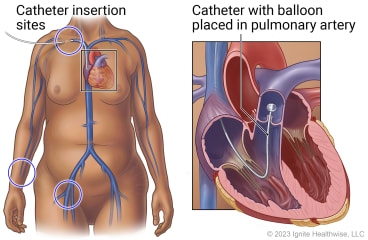
What is it?
Right heart catheterization is a test to check the right side of your heart. The right side of the heart receives blood from the body and pumps it to the lungs. The blood picks up oxygen in the lungs.
A doctor will insert a thin, flexible tube (catheter) into a blood vessel in your neck, groin, or arm. During the test, the doctor moves the catheter through the blood vessel into your heart.
Why is this test done?
The test checks the blood pressure and oxygen levels in your lungs and heart. It also checks how well your heart is pumping. This test is different from left heart catheterization. That test checks for blockages in the coronary arteries.
How do you prepare for the procedure?
Procedures can be stressful. This information will help you understand what you can expect. And it will help you safely prepare for your procedure.
 Preparing for the procedure
Preparing for the procedure
- Be sure you have someone to take you home. Anesthesia and pain medicine will make it unsafe for you to drive or get home on your own.
- Understand exactly what procedure is planned, along with the risks, benefits, and other options.
- Tell your doctor ALL the medicines, vitamins, supplements, and herbal remedies you take. Some may increase the risk of problems during your procedure. Your doctor will tell you if you should stop taking any of them before the procedure and how soon to do it.
- If you take a medicine that prevents blood clots, your doctor may tell you to stop taking it before your procedure. Or your doctor may tell you to keep taking it. (These medicines include aspirin and other blood thinners.) Make sure that you understand exactly what your doctor wants you to do.
- Make sure your doctor and the hospital have a copy of your advance directive. If you don't have one, you may want to prepare one. It lets others know your health care wishes. It's a good thing to have before any type of surgery or procedure.
How is the test done?
- The test is done in a hospital, often in a cardiac catheterization laboratory ("cath lab"). You lie on a table under a large X-ray machine.
- You may get medicine through an I.V. in one of your veins to help you relax.
- You will be awake during the procedure, but you may not be able to remember much about it. The doctor will inject some medicine to numb the skin where the catheter will be put in. You will feel a small needle stick, like having a blood test. You may feel some pressure when the doctor puts in the catheter.
- The doctor may look at X-ray pictures on a monitor (like a TV screen) to move the catheter to your heart and lungs.
- The doctor will check things like blood pressure inside your heart and lungs.
- The catheter will be removed. A nurse may press on a bandage on the opening to prevent bleeding.
- After the procedure, pressure may be applied for a short time to the area where the catheter was put into your blood vessel. This will help prevent bleeding. A small device may also be used to close the blood vessel. You may have a bandage or compression device on the catheter site.
- You will stay in a room for at least a few hours to make sure the catheter site starts to heal.
- If the catheter was placed in your neck or arm, you may sit up in your bed. If the catheter was placed in your groin, you may lie in bed for up to a few hours.
How long does the test take?
The test may take about 1 hour. But you need time to get ready for the test and time to recover. This can take a few hours.
What happens after the test?
You may be able to go home later the same day. Or you might need to stay in the hospital overnight.
Follow-up care is a key part of your treatment and safety. Be sure to make and go to all appointments, and call your doctor if you are having problems. It's also a good idea to keep a list of the medicines you take. Ask your doctor when you can expect to have your test results.
Where can you learn more?
Go to http://www.healthwise.net/patientEd
Enter D544 in the search box to learn more about "Right Heart Catheterization: About This Test".
Current as of: July 31, 2024
Author: Ignite Healthwise, LLC Staff
Clinical Review Board
All Ignite Healthwise, LLC education is reviewed by a team that includes physicians, nurses, advanced practitioners, registered dieticians, and other healthcare professionals.

